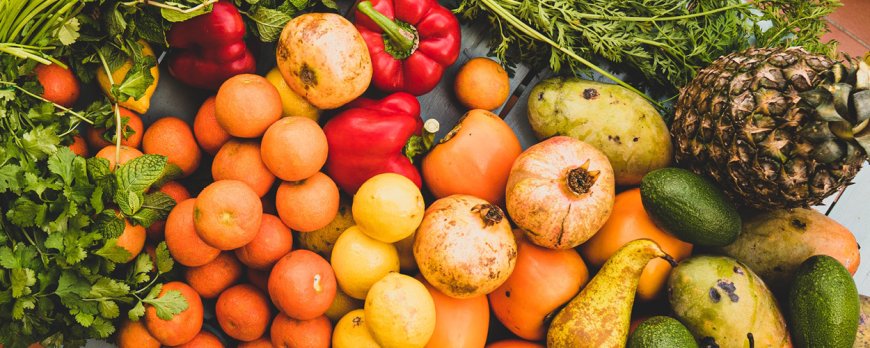Which vegetable is best for heart?
Discover which vegetable is best for heart health. Our comprehensive guide dives into tasty options that can boost your cardiovascular wellbeing.

Which Vegetable is Best for the Heart?
Maintaining a healthy heart is crucial for overall wellness, and one simple way to support heart health is by including nutrient-rich vegetables in your diet. Leafy green vegetables like spinach, kale, and collard greens are considered the best vegetables for heart health. They are high in vitamin K and nitrates, which can help reduce blood pressure and improve arterial function. Other vegetables that are beneficial for the heart include asparagus, carrots, broccoli, garlic, green beans, and squash. These vegetables contain various nutrients and antioxidants that contribute to heart health. It is recommended to incorporate a variety of vegetables into the diet, including fresh, frozen, canned, or dried options.
Key Takeaways:
- Leafy green vegetables like spinach, kale, and collard greens are excellent choices for heart health.
- These vegetables are high in vitamin K and nitrates, which support blood pressure reduction and arterial function improvement.
- Asparagus, carrots, broccoli, garlic, green beans, and squash are also beneficial for heart health due to their rich nutrient content.
- Incorporating a variety of vegetables into the diet, including different forms like fresh, frozen, canned, or dried, can maximize heart health benefits.
- Maintaining a healthy heart is crucial for overall wellness, and vegetables play a vital role in supporting cardiovascular wellbeing.
Leafy Green Vegetables: Spinach, Kale, and Collard Greens
Leafy green vegetables such as spinach, kale, and collard greens are often hailed as the superheroes of heart-healthy vegetables, packed with vital nutrients that can support a strong cardiovascular system. These leafy greens are rich in vitamin K, which plays a crucial role in blood clotting and maintaining healthy arteries. In addition, they are high in nitrates, compounds that have been shown to lower blood pressure and improve arterial function.
Spinach, kale, and collard greens are also low in calories and high in fiber, making them a great addition to any heart-healthy diet. Their high fiber content helps to regulate cholesterol levels and promote healthy digestion. Furthermore, these leafy greens are full of antioxidants, such as beta-carotene and lutein, which can help protect against oxidative stress and inflammation, both of which are linked to heart disease.
Adding leafy green vegetables to your meals can be as easy as tossing a handful of spinach into a smoothie, sautéing kale with garlic as a side dish, or using collard greens as a wrap instead of tortillas. With their versatility and numerous health benefits, it's no wonder why leafy green vegetables are a top choice for heart health.
Asparagus: A Heart-Healthy Choice
Asparagus, with its delicate spears and unique flavor, is not only a delicious vegetable but also a heart-healthy choice, boasting an array of nutrients that promote heart health. This versatile veggie is a rich source of folate, a B vitamin that helps reduce homocysteine levels in the blood, thereby protecting against cardiovascular disease.
In addition to folate, asparagus is packed with antioxidants, such as vitamins C and E, which help reduce inflammation and prevent oxidative stress on the heart. The presence of potassium in asparagus can also contribute to maintaining healthy blood pressure levels.
More Reasons to Love Asparagus:
- High fiber content: Asparagus is a fiber-rich vegetable that aids in digestion and helps regulate cholesterol levels.
- Low calorie: With about 20 calories per serving, asparagus is a great addition to a heart-healthy diet for weight management.
- Rich in vitamin K: Vitamin K supports proper blood clotting and may help maintain healthy arteries.
Whether roasted, steamed, grilled, or added to salads, asparagus is a flavorful and nutritious choice that can contribute to a healthier heart. Consider incorporating this exceptional vegetable into your regular diet to reap its abundant benefits.

Carrots: A Heart-Healthy Vegetable
Carrots, with their vibrant orange hue and crunchy texture, offer more than just visual appeal - they are also packed with nutrients that can contribute to a healthy heart. Rich in antioxidants, carrots help reduce oxidative stress and inflammation in the cardiovascular system, promoting optimal heart health.
One of the key nutrients found in carrots is beta-carotene, a powerful antioxidant that converts to vitamin A in the body. Vitamin A plays a crucial role in maintaining the integrity of the heart and blood vessels, while also supporting overall immune function. Additionally, carrots are a good source of fiber, which aids in digestion and helps regulate cholesterol levels, further reducing the risk of heart disease.
Additional Heart-Healthy Benefits of Carrots:
- The high potassium content in carrots helps regulate blood pressure levels, reducing strain on the heart.
- The phytochemicals in carrots, such as lutein and zeaxanthin, promote healthy vision and may have cardioprotective effects.
- Carrots are low in calories and high in water content, making them a great choice for weight management and heart health.
Whether enjoyed raw or cooked, carrots are a versatile vegetable that can be easily incorporated into your daily meals. Add them to salads for a refreshing crunch, roast them with herbs and spices for a flavorful side dish, or blend them into smoothies for a nutritious boost. Remember, variety is key, so don't be afraid to experiment with different ways of preparing and enjoying this heart-healthy vegetable.
Broccoli: A Heart-Healthy Choice for Your Cardiovascular System
Broccoli, with its distinct florets and impressive nutrient profile, is not only a versatile vegetable but also a heart-healthy choice that can provide numerous benefits for your cardiovascular system. Packed with essential vitamins, minerals, and antioxidants, broccoli is a nutritional powerhouse that supports heart health in various ways.
Nutritional Value of Broccoli
This cruciferous vegetable is rich in vitamin K, which plays a vital role in preventing artery calcification and maintaining healthy blood clotting. Broccoli is also abundant in dietary fiber, which helps regulate cholesterol levels and lower the risk of heart disease. Moreover, it contains sulforaphane, a powerful compound that exhibits anti-inflammatory and antioxidant properties.
Heart Health Benefits
- Reduced Risk of Cardiovascular Disease: The combination of fiber, antioxidants, and anti-inflammatory compounds in broccoli helps reduce inflammation, lower blood pressure, and improve overall cardiovascular health. Studies have shown that regular consumption of broccoli is associated with a reduced risk of heart disease.
- Improved Cholesterol Levels: The fiber content in broccoli helps lower LDL (bad) cholesterol while increasing HDL (good) cholesterol, which promotes a healthy lipid profile and reduces the risk of plaque buildup in the arteries.
- Enhanced Blood Pressure Control: The abundance of nitrates in broccoli promotes vasodilation, leading to improved blood flow and reduced blood pressure. This can further decrease the risk of heart-related complications.
Whether enjoyed steamed, roasted, or added to salads and stir-fries, incorporating broccoli into your diet is a simple yet effective way to support heart health and maintain a well-rounded cardiovascular system.

Garlic: A Flavorful and Heart-Healthy Ingredient
Garlic, with its pungent aroma and unmistakable flavor, is not only a beloved ingredient in many dishes but also a powerful ally for heart health, thanks to its remarkable properties. This popular vegetable contains a compound called allicin, which has been shown to have numerous cardiovascular benefits.
When consumed, allicin can help lower cholesterol levels and reduce blood pressure, both of which are key factors in maintaining a healthy heart. Additionally, garlic has been linked to improved arterial function, promoting better blood flow throughout the body.
Ways to Incorporate Garlic into Your Diet
- Add a few cloves of garlic to your favorite pasta sauces or stir-fries for an extra burst of flavor and health benefits.
- Roast whole garlic heads until soft and spread the creamy, mellow garlic on toasted bread for a delicious and heart-healthy snack.
- Experiment with garlic-infused oils or powders to add a subtle hint of garlic to your dishes.
Remember, garlic is most potent when consumed raw or lightly cooked. So, to reap its maximum heart-healthy benefits, consider incorporating it into your diet in its freshest form.
In conclusion, garlic is not just a flavorful ingredient but also a nutritional powerhouse for heart health. By adding garlic to your meals, you can enjoy its savory taste while providing your heart with valuable support.
Green Beans: A Heart-Healthy Delight
Green beans, with their vibrant color and crisp texture, are not only a delightful addition to any meal but also a heart-healthy vegetable that offers numerous benefits for your cardiovascular system. Packed with essential nutrients, green beans are an excellent choice for promoting heart health and overall wellbeing.
1. Nutrient-Rich Goodness
Dive into a serving of green beans, and you'll be treating your body to a wealth of vitamins and minerals. These legumes are a great source of vitamin C, which acts as a powerful antioxidant, protecting your heart from oxidative stress. Additionally, green beans boast a rich content of fiber, essential for maintaining healthy cholesterol levels and supporting optimal heart function.
2. Blood Pressure Regulation
One of the standout qualities of green beans for heart health is their ability to help regulate blood pressure. Green beans are naturally low in sodium and high in potassium, a combination that can help lower blood pressure levels. By adding green beans to your meals, you're promoting healthy blood flow and reducing the risk of hypertension.
3. Heart-Friendly Antioxidants
Green beans are a fantastic source of antioxidants, such as flavonoids and carotenoids, which play a crucial role in protecting your heart. These antioxidants neutralize harmful free radicals in the body, reducing inflammation and lowering the risk of heart disease. Including green beans in your diet can have a positive impact on your heart health in the long run.
Whether you steam them, sauté them, or add them to salads or stir-fries, green beans are a versatile and heart-healthy vegetable that can be easily incorporated into your diet. So, why not savor their vibrant taste while reaping all the cardiovascular benefits they have to offer!

Squash: A Heart-Healthy Choice for Your Wellbeing
Squash, with its wide range of varieties and rich flavor, is not only a versatile vegetable but also a heart-healthy choice that can provide valuable nutrients for your cardiovascular wellbeing. Whether you prefer butternut, acorn, or spaghetti squash, incorporating this vegetable into your diet can offer numerous benefits.
First and foremost, squash is a great source of vitamins and minerals. It contains high levels of potassium, a mineral essential for maintaining a healthy blood pressure and heart rhythm. Additionally, squash is rich in fiber, which aids in digestion and can help lower cholesterol levels, reducing the risk of heart disease.
Furthermore, squash is packed with antioxidants, such as beta-carotene and vitamin C, which help protect your heart from oxidative stress and inflammation. These compounds play a crucial role in maintaining the health of your blood vessels and reducing the risk of cardiovascular problems.
To make the most of the heart-healthy benefits of squash, consider incorporating it into your meals in various ways. Roast it as a side dish, blend it into a creamy soup, or use it as a healthier alternative to pasta by spiralizing it into noodles. By adding squash to your diet, you can support your heart health while enjoying its delicious flavor and versatility.
The Importance of Variety
While certain vegetables shine in their heart-protective qualities, it is important to remember that a varied and diverse vegetable intake is key to reaping the full spectrum of benefits for your cardiovascular system. Incorporating a wide range of vegetables into your diet ensures that you are receiving a diverse array of nutrients, antioxidants, and phytochemicals that work synergistically to support heart health.
One way to achieve variety is by exploring different types of leafy greens such as spinach, kale, and collard greens. These vegetables are rich in vitamin K and nitrates, which have been linked to a reduction in blood pressure and improved arterial function. Including asparagus in your diet can also provide heart-healthy benefits, as it is known for its nutritional content and contribution to cardiovascular well-being.
Carrots, broccoli, garlic, green beans, and squash are other vegetables that offer specific advantages for heart health. Carrots, for example, are packed with antioxidants that help fight against oxidative stress, while broccoli boasts a wide range of nutrients that support cardiovascular well-being. Garlic, renowned for its pungent aroma, contains unique compounds that have been shown to protect the heart. Green beans and squash also make excellent additions to a heart-healthy diet due to their nutrient content and contributions to cardiovascular well-being.
Benefits of Variety for Heart Health:
- Diverse nutrients: Each vegetable brings its own unique combination of vitamins, minerals, and antioxidants, enhancing overall heart health.
- Broad spectrum of phytochemicals: Different vegetables contain various phytochemicals, which have been shown to provide protection against cardiovascular diseases.
- Increased fiber intake: A variety of vegetables ensures a higher intake of dietary fiber, which aids in maintaining healthy cholesterol levels and reducing the risk of heart disease.
- Improved overall diet quality: Incorporating a variety of vegetables into your meals encourages a more well-rounded and nutritious diet, which is essential for heart health.
Remember to embrace the variety of vegetables available to us, be it fresh, frozen, canned, or dried. By broadening our vegetable choices and incorporating them into our daily meals, we can take important steps towards protecting our heart and promoting overall cardiovascular well-being.

Additional Tips for Heart Health
In addition to incorporating heart-healthy vegetables into your diet, there are several other steps you can take to support your cardiovascular wellbeing.
- Stay Active: Engaging in regular physical activity is crucial for maintaining a healthy heart. Aim for at least 30 minutes of moderate exercise, such as brisk walking or cycling, most days of the week. Exercise helps improve blood circulation, strengthen the heart muscle, and control blood pressure.
- Manage Stress: Chronic stress can take a toll on your heart health. Find healthy ways to manage stress, such as practicing relaxation techniques like deep breathing or meditation. Engaging in activities you enjoy, spending time with loved ones, and getting enough restful sleep can also help reduce stress levels.
- Limit Salt Intake: Excessive salt consumption can contribute to high blood pressure, which is a risk factor for heart disease. Be mindful of your salt intake and opt for low-sodium alternatives when possible. Flavor your meals with herbs, spices, or lemon juice instead.
- Avoid Smoking: Smoking damages blood vessels and increases the risk of developing heart disease. If you smoke, quitting is one of the best things you can do for your heart health. Seek support from healthcare professionals or join smoking cessation programs to help you kick the habit.
Eat a Balanced Diet
Incorporating heart-healthy vegetables is just a part of maintaining a well-rounded diet. Consume a wide variety of foods, including lean proteins like fish and chicken, whole grains, and healthy fats like avocados and olive oil. Limit your intake of processed foods, sugary snacks, and beverages high in added sugars.
Remember, taking care of your heart involves making conscious choices every day. By incorporating heart-healthy vegetables, staying active, managing stress, watching your salt intake, avoiding smoking, and maintaining a balanced diet, you can support your cardiovascular wellbeing and enhance your overall health.
Conclusion
In conclusion, incorporating a variety of vegetables, including leafy greens, asparagus, carrots, broccoli, garlic, green beans, and squash, into your diet can play a vital role in promoting a healthy heart and overall cardiovascular wellbeing.
Leafy green vegetables such as spinach, kale, and collard greens are especially beneficial for heart health due to their high levels of vitamin K and nitrates. These nutrients are known to reduce blood pressure and improve arterial function, which are key factors in maintaining cardiovascular wellbeing.
Additionally, vegetables like asparagus, carrots, broccoli, garlic, green beans, and squash offer a range of nutrients and antioxidants that further support heart health. Their nutritional content helps to protect against oxidative stress and inflammation, both of which can contribute to the development of cardiovascular diseases.
It is important to note that incorporating a variety of vegetables into the diet is crucial for maximizing the heart health benefits. Whether fresh, frozen, canned, or dried, each type of vegetable brings unique nutrients and compounds that contribute to overall cardiovascular wellbeing. By diversifying your vegetable intake, you ensure that your body receives a wide range of essential vitamins, minerals, and antioxidants.
So, make an effort to include a colorful array of vegetables in your meals and snacks. Whether you add leafy greens to your salads, enjoy roasted asparagus or carrots as a side dish, or sauté garlic and green beans for a flavorful stir-fry, each vegetable choice brings you one step closer to a healthy heart. Remember, small changes in your diet can have a big impact on your cardiovascular wellbeing, so start incorporating these heart-healthy vegetables today.
FAQ
Which vegetables are considered the best for heart health?
Leafy green vegetables like spinach, kale, and collard greens are considered the best vegetables for heart health.
What makes leafy green vegetables beneficial for the heart?
Leafy green vegetables are high in vitamin K and nitrates, which can help reduce blood pressure and improve arterial function.
Are there any other vegetables that are beneficial for the heart?
Yes, other vegetables that are beneficial for the heart include asparagus, carrots, broccoli, garlic, green beans, and squash.
How do these vegetables contribute to heart health?
These vegetables contain various nutrients and antioxidants that contribute to heart health.
Is it recommended to include a variety of vegetables in the diet?
Yes, it is recommended to incorporate a variety of vegetables into the diet, including fresh, frozen, canned, or dried options.


































































































































